Download a PDF of Men of God in the City of Man, Part 2: Carriers (paid subscribers only)
Listen to an audio recording of Men of God in the City of Man, Part 2: Carriers
Also available at:
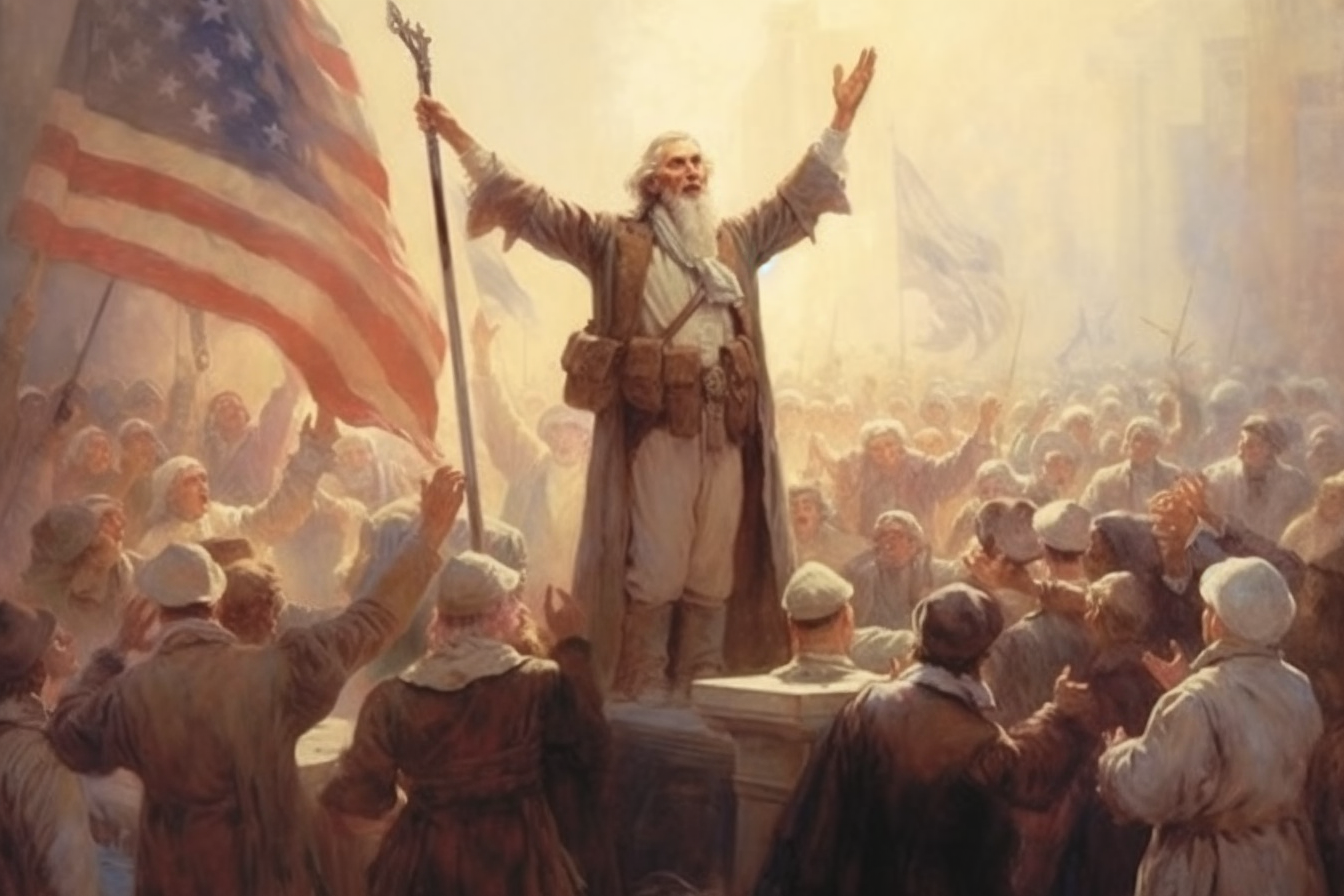
At some point, Eric went from idolizing people like Os Guinness to idolizing Ann Coulter and Tucker Carlson — right wing political firebrands who live to ‘own the libs.’ I think there’s an adrenaline rush or dopamine hit from engaging in full-fledged culture wars that otherwise thoughtful souls on both sides of the political spectrum can find intoxicating. For some, life is worth living only when ‘the soul of America’ is at stake. So the soul of America is ALWAYS at stake.
Phil Vischer, evangelical Christian author, podcaster and creator of Veggietales
Men of God in the City of Man is a nine-part essay series that tells the story of a powerful Narrative virus whose ultimate unintended target was nothing less than faith in American democracy as an institution. Part 1 introduced the idea of the narrative virus as a mechanism for astroturfing (fake grassroots) campaigns, and the idea that the danger may not come so much from forcing new Common Knowledge, but changing what some of the population needed to be true. Part 2 is the story of the carriers of its chief ultimate symptom: a rabid belief in rampant electoral fraud.
I am deeply indebted to the work of Jim Beverley, Matthew Taylor and Paul Djupe in various areas of this essay series. I have attempted to source their work where possible, but if you see something unsourced that makes a clever observation about our subject matter, please do me the favor of assuming it is the work of their dutiful scholarship.
Before we can really understand the narrative virus, its design, the mechanisms of its spread, or how this ought to make us think about how AI might accelerate similar efforts in the future, we must understand what it is that distinguishes the carriers – and what that tells us about the underlying memetic structure of the narrative virus.
Where do we start? How about the carrier that is still fighting “Stop the Steal” battles today: Kari Lake.
Kari Lake
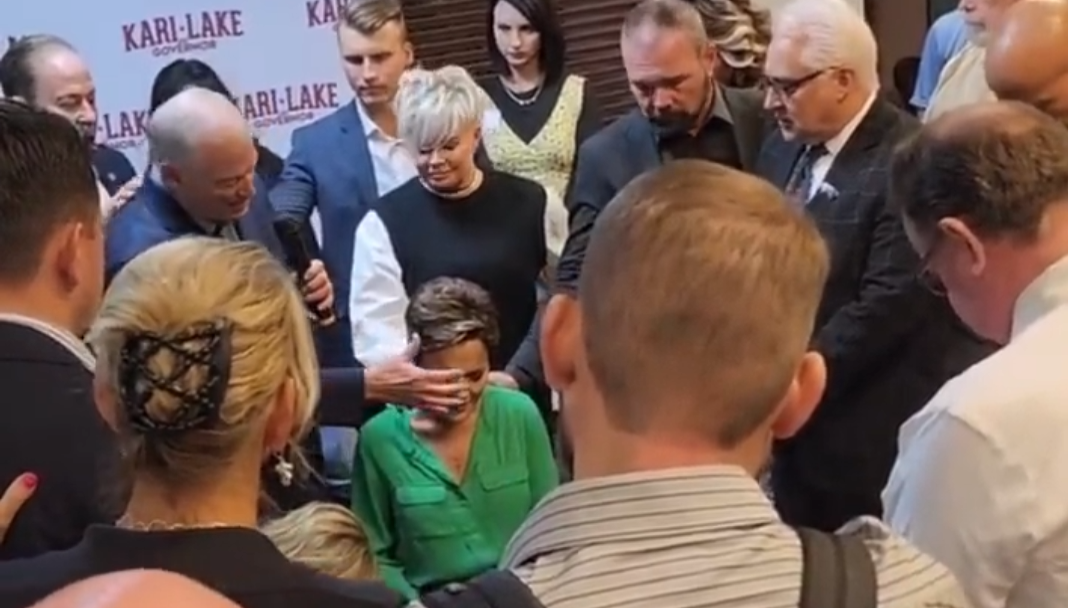
If you have been following along since 2020, you will know that the former news anchor has been a major vector for general claims of electoral fraud for years now. She has pursued those claims aggressively, both in advance of and following her failed gubernatorial bid in Arizona. More specifically, she was vocal about claims of electoral fraud in the 2020 presidential election and in her own 2022 loss, going so far as to call for Maricopa County election officials to be imprisoned.
And she was just getting started.
I have a message tonight for Merrick Garland, Jack Smith and Joe Biden and the guys back there in the fake news media. You should listen up as well, this one’s for you. If you want to get to President Trump, you’re going to have to go through me, and 75 million Americans just like me. <standing ovation and cheering> And I’m going to tell you, most of us are card-carrying members of the NRA. <louder cheering> That’s not a threat, that’s a public service announcement. <laughing and cheering>
Failed gubernatorial candidate Kari Lake at a June 9, 2023 speaking event in Georgia
While often described generically by media as a Christian nationalist (and by anonymously reported friends as a Buddhist), since her claimed conversion during the pandemic, Lake has quickly integrated her persona into the informal networks and narratives of the charismatic Church. Charisma News wondered if she was being raised up as a “new breed of prophetic politician.” At a “Freedom and Faith Revival Night” she hosted in 2022, worship was led by Sean Feucht, the minor charismatic worship artist who emerged to some prominence in 2021 through his protests against lockdowns and his alignment with the anti-vaxxers and Stop the Steal proponents at multiple Reawaken America events. Before the service, she was anointed with oil. It is a Biblical practice, and one that has a long association with the Pentecostal and charismatic church in America. This kind of Pentecostal anointing differs greatly from Catholic and some mainline Protestant use (i.e. this is not the Anointing of the Sick).
The older man with the microphone applying the oil in the image that kicked off this section is Dream City’s Tommy Barnett, one of the most prominent Pentecostal ministers in the country and an establisher of nationwide networks of Dream City community centers. Laying hands on Lake to her immediate left is Mark Driscoll, a famous pastor and former church network builder who sits at the periphery of the mainstream evangelical church and the charismatic world.
Lake has been a frequent fixture on Flashpoint, an evening commentary program hosted on the Victory Channel, the Christian TV network owned by the ministries of famed charismatic / prosperity gospel preacher Kenneth Copeland. I suspect it is the first time you have heard of the network or program, but it won’t be the last. In the last few years, it has been deeply influential and connected to the promotion of electoral fraud claims AND to the spread of the underlying narratives that integrated those claims with charismatic Christian nationalism.
How connected? Well, by way of example, Flashpoint also hosted a live program from Phoenix, Arizona in October 2022 as a de facto Kari Lake rally. After the introduction video showing various self-named apostles and prophets from the charismatic-Pentecostal movement, the host begins to rattle off a who’s who of Arizona voices from and individuals involved with electoral fraud claims, asking them to stand to be celebrated.
Guys like Mark Finchem, the Arizona state representative and failed candidate for secretary of state that you may remember for his promotion of the sophomoric analysis of tens of thousands of missing votes on social media, or perhaps for his quickly dismissed lawsuit to overturn his election loss that resulted in his paying legal fees to his opponent. Finchem was also a speaker at multiple Reawaken America tour events, the charismatic political/religious rally where we spotted Ken Paxton.
Or like Wendy Rogers, founding and proud Oath Keeper in the Arizona Senate. She made herself famous for a time on social media promoting 2020 electoral fraud claims, suggesting that citizens’ response to Biden’s victory should be to “buy more ammo”, and pushing the Maricopa audit that found positively nothing of consequence. Thereafter, she pivoted to a national campaign to decertify electors. Rogers is likewise a recurring guest on the charismatic Christian Flashpoint program, where she speaks to the host and panel of prophet/patriots about important issues, such as issuing arrest warrants for people involved in the “stolen election” of 2020.
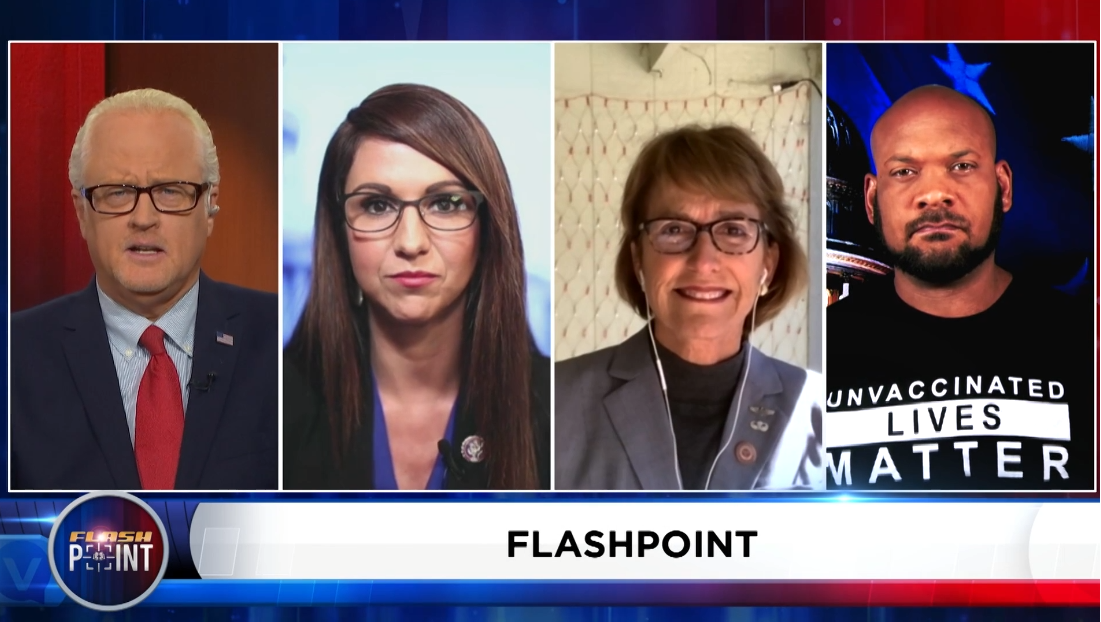
If you want a picture of the complete integration of these movements and have 30-40 minutes to invest, simply watch the live broadcast from Arizona. Flashpoint’s ongoing obsession with the 2020 election and reinstating Donald Trump has even meant that newly lawsuit-shy Fox News Corp is now banning its on-air personalities from participation in their programming.
But wait! There’s more.
For example, during the 2022 election aftermath, the response of the Lake campaign and its supporters was anything but “mainstream evangelical” in nature. On November 12th and 13th, Lake’s supporters arrived at the building where the Maricopa County results were being tabulated and conducted a “Jericho March”, circling the building seven times. Now, Jericho Marches or Jericho Walks are not explicitly charismatic. The idea behind them is that a group of Christians across the spectrum of beliefs and denominations will walk, and often pray, together in belief that their unity and prayers can bring down figurative (or literal) walls. Sometimes the walls are things like gang violence, injustice or racism. Sometimes the walls are things like abortion or perceived degradation in cultural values.
And sometimes the walls are legitimate election outcomes that we just don’t like very much.
Still, there are Jericho Marches and then there are Jericho Marches. This one, along with the one we’ll talk about later when we get to the ringleaders of the D.C. version that preceded this Arizona display, is the latter kind. And the ‘latter kind’ means shofars. If being prayed over in tongues while being anointed with oil was unfamiliar to you, I am guessing this will be, too. Shofars are hollowed horns (usually from rams) that are a traditional part of various Jewish rituals, but mostly ceremonies and announcements. They were also used in the siege on Jericho described in the Book of Joshua in the Old Testament. In the original story, after the besieging army blows their shofars on the seventh circling of the city, the walls fall down…after which, apropos of nothing, the soldiers rush in to kill everyone in the city. As an imperfect rule of thumb, if you see a shofar and no non-Messianic Jewish people, it’s probably a charismatic-Pentecostal thing. If you also hear people chanting in tongues and “prayer languages” as they do so, it’s definitely a charismatic-Pentecostal thing. This, and the D.C. march, were unequivocally that flavor of event.
Lauren Boebert
Representative Boebert, one of the leading promoters of electoral fraud claims in the 2020 election, doesn’t simply speak and participate in the charismatic vernacular. By her own description, her home church during and following her recent rediscovery of her faith (a recurring theme in this list, you will find) was the New Creation Church in Glenwood Springs, Colorado. It is a non-denominational charismatic church that sits very clearly on the Pentecostal end of the spectrum, its statement of beliefs emphasizing the gift of tongues in particular alongside the other 1 Corinthians charisms.
She frequently tours with and speaks at events hosted by various non-profit initiatives of the aforementioned former Bethel charismatic worship recording artist Sean Feucht, including the capitol worship service pictured below. Like many others listed here, she is regular guest and panelist presented alongside prophets and apostles on the Flashpoint program on Kenneth Copeland’s Victory Channel (you may have noticed her cameo with Wendy Rogers above).

Marjorie Taylor Greene
Marjorie Taylor Greene has similar credentials to Boebert when it comes to the promotion of electoral fraud claims, once famously wearing a cloth mask embroidered with the text “TRUMP WON” to the floor of congress in January 2021. It was a sentiment that led her to file (unsuccessful) articles of impeachment for President Biden immediately after his inauguration.
Greene’s and Boebert’s associations with charismatic practices and language are similar, too. In July 2022, for example, after giving a speech about the revelations of 2,000 Mules, Representative Greene had hands laid on her by four of the more prominent charismatic and Pentecostal apostles and prophets (all of whom have preached that the 2020 election was stolen from Donald Trump). From right to left, that’s Mario Murillo, Hank Kunneman, Dutch Sheets and Lance Wallnau, all self-described prophets or apostles, all deeply embedded in the very spiritual gifts-oriented wing of the charismatic and Pentecostal church in America.
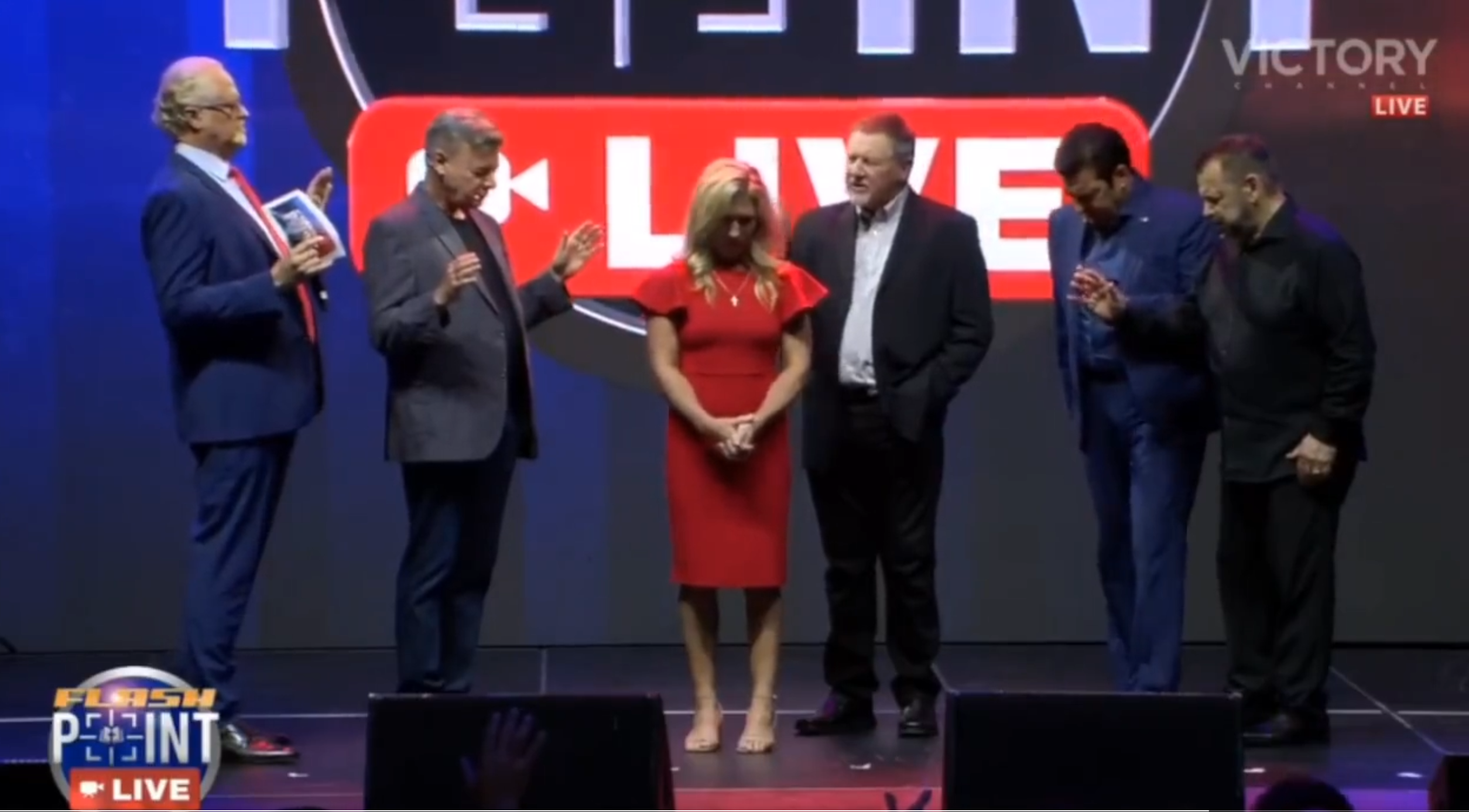
Her language in public statements and on social media is rich with the language of this vernacular, much of which would be seen as a bit much to the average “white evangelical.” She commonly describes spiritual battles, struggles against demonic, Satanic and occult forces of evil arrayed against her and America more broadly, and the need for Christians to exercise their authority to oppose those forces through spiritual warfare.
Unlike Boebert, Greene’s home church sits well in the more traditional evangelical end of the spectrum. Andy Stanley, the head pastor at her church and son of recently departed evangelist Charles Stanley, is a lot of things. Pentecostal isn’t one them. Like Ken Paxton and many others on this list, MTG appears to be an evangelical whose association with conspiracy theory-laden political narratives necessarily brought her into the mesh networks, as Matthew Taylor first referred to them, of charismatic and Pentecostal apostles.
Dinesh D’Souza
Like Greene, D’Souza was raised Catholic. Like Greene, D’Souza adopted a reformed protestant faith later in life. Unlike Greene, his conversion immediately led him into the charismatic movement. He professes that he went from lukewarm to mature and devoted Christian within the Calvary Chapel that he and his then wife attended in San Diego. To be fair, while Calvary Chapel was at the very ground floor of the Jesus People movement that catalyzed the explosion of charismatic church growth in the United States (and is decidedly continuationist), it is also among the less wacky-seeming to outsiders of the charismatic-Pentecostal church families. Again, your mileage may vary.
Still, there can be no questioning his comfort and connection to charismatic language, practices and networks. For example, he has spoken publicly about the need for “prophetic voices,” in one case doing so in response to a podcaster conveying a dream from God about Dinesh himself. More importantly, the principal co-laborers in his work producing 2,000 Mules, the film in which D’Souza presents claims that phone geolocation data proved that paid mules were moving harvested ballots from stash-houses to ballot boxes, were deeply connected to charismatic networks that were key to the promotion and spread of electoral fraud narratives.
Catherine Engelbrecht, for example, led the True the Vote initiative that conducted the underlying “research” presented in 2,000 Mules. You may recall that Engelbrecht and her partner Gregg Phillips were famously and briefly jailed for contempt after the refusal to “give up” a source in a defamation case against them relating to electoral fraud claims. Prior to their jailing, they beseeched prayer warriors to intercede on their behalf. They had a ready-made venue to do so, as Engelbrecht and Phillips had already joined their stolen election soapbox with Intercessors for America, a charismatic organization with clearly stated beliefs in the prophetic and other gifts of the spirit, in a partnership that would be called “Pray the Vote.” In other words, it would not be very far off to say that D’Souza’s 2,000 Mules was, from top to bottom, a work product of the charismatic movement in the United States.
Roger Stone
Depending on whom you ask, Roger Stone either created Stop the Steal himself, inspired its creation, or else co-created it with Ali Alexander (who you may recall was recently in the news). He is perhaps as connected to the public-facing effort to dispute the 2020 election outcome as anyone save former President Trump himself.
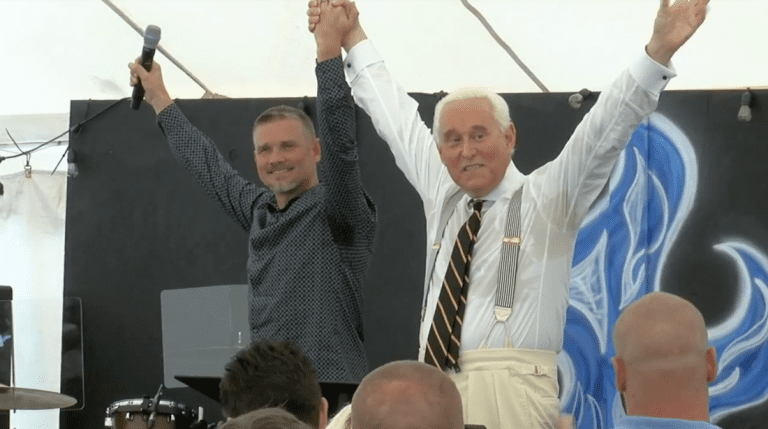
“Famous man of faith” is probably not the first descriptor I personally would have applied to Mr. Stone, although perhaps I just haven’t been paying close attention. Or maybe I’m just hopelessly biased against lobbyists. Wretched man that I am, I find it hard to claim any high ground to doubt the authenticity of anyone’s faith. At any rate, the Catholic-born former lobbyist claims to have been saved during the aftermath of the Mueller investigation, convinced by the supernatural intervention of…Donald Trump. Stone recounted his personal Damascus Road like this in his pre-recorded speech to one of his rallies:
“It was Jesus Christ who gave our president, Donald Trump, the courage and the compassion to save my life when I was unfairly and illegally targeted in the Mueller witch hunt. … My faith is in Jesus Christ, and we will make America great again and we will stop the steal.”
Roger Stone
But simple conversion to Christianity or even evangelical Christianity is not enough if you’re going to lead Stop the Steal. To observe the proper forms, you must become a panelist on the Victory Channel’s Flashpoint program or join the Reawaken America tour (remember Ken Paxton from Part 1?), or both. Which he did. And he fit right in.
“There is a satanic portal above the White House, you can see day and night. It exists. It is real. And it must be closed. And it will be closed by prayer. You can see it on the livestream of a video pointed at the White House. No, it is not an Aerostat Weather Balloon. No, it is not infracted (sic) light. No, it is not a reflection. It popped up after Joe Biden became President, and it will be closed before he leaves.“
Roger Stone, in a May 13, 2022 speech to the Reawaken America conference event held in South Carolina
This is not typical evangelical rhetoric. Crusty evangelicals don’t talk about visible Satanic portals. They don’t prophesy about when and how those portals will be closed. Every word of this is the calling card of a prophetic, spiritual warfare-oriented charismatic dialect.
Mike Lindell
Lindell, like Roger Stone, underwent a recent conversion experience. Unlike Stone, however, Lindell’s path to salvation did not come through the hand of Donald Trump directly, but instead through a member of his cabinet Lindell met at the National Prayer Breakfast: Ben Carson.
Lindell’s attachment to the prophetic is, perhaps, unique among this group in that it is inextricably tied to former President Trump.
“I got to 2015 and I had a dream. I get these dreams, these prophetic dreams. And one of them was that I would meet Donald Trump in a room…divine appointments kept happening to me. I was invited to the national prayer breakfast when Ben Carson was still running for president. And I was randomly picked out of 12 people to pray with him in a room. And I wasn’t even saved yet. I’m going, ‘I don’t know how to pray’, I was all nervous. But that was set up by God, you know…and these things kept happening, to the summer of 2016 and I’m on a plane to California and I’m sitting in the bulkhead and I open this magazine and it’s about Donald Trump and I said, you know, of course, this was late July of 2016, and I said, “God, if I’m supposed to meet Donald Trump and be part of this, whatever’s going on in our country, I need to know right now.” And at that moment in time, my phone dinged, and it was an email. “Mike, this is Donald Trump. Will you meet me in New York City in Trump Tower.” And I go “GOD!”
“This has been a spiritual battle in our country for decades. This is a spiritual battle. And this is the start of the greatest revival in history for one nation, under God and that God is Jesus. Amen.”
Mike Lindell’s speech at the Jericho March in Washington D.C. on December 12, 2020
Outside of his own prophetic dreams, Lindell is probably the most connected to each of the recurring charismatic-Pentecostal venues on this list. For example, he’s a regular on the Victory Channel’s Flashpoint, including traveling to participate in live recordings like this one in Omaha, Nebraska.
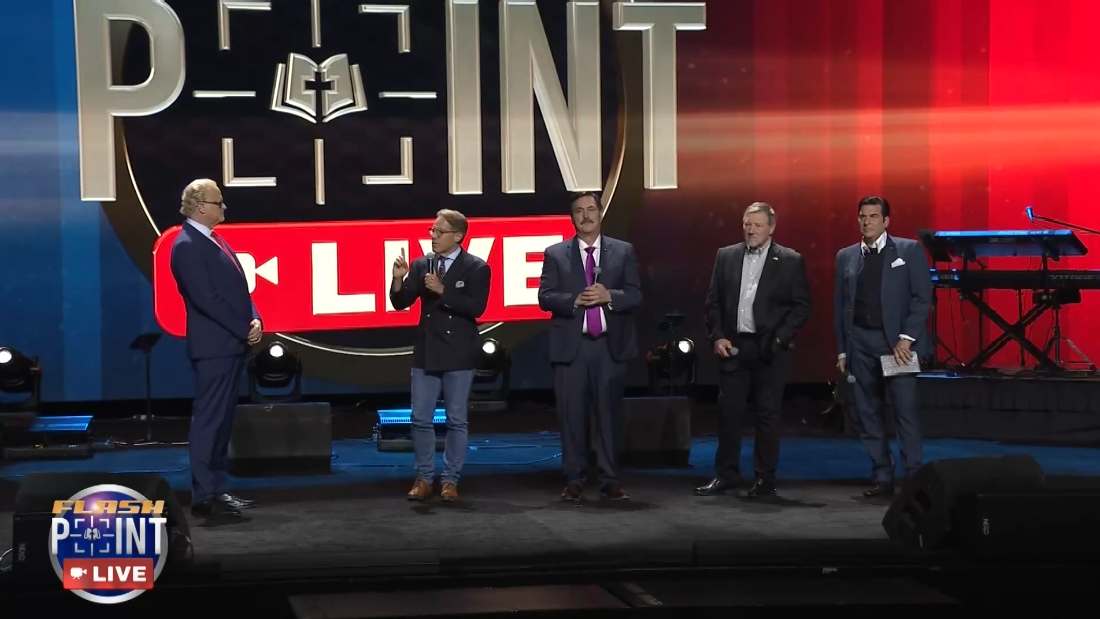
Lindell is also a regular participant on the Reawaken America tour, the General Flynn-led, Charisma News-sponsored tour we’ve mentioned a couple times now, at which prophets, apostles and other religious personalities share the stage with anti-vaccine activists, COVID truthers, local political figures and, on occasion, Cathy O’Brien. Lindell is typically a headliner at these events.
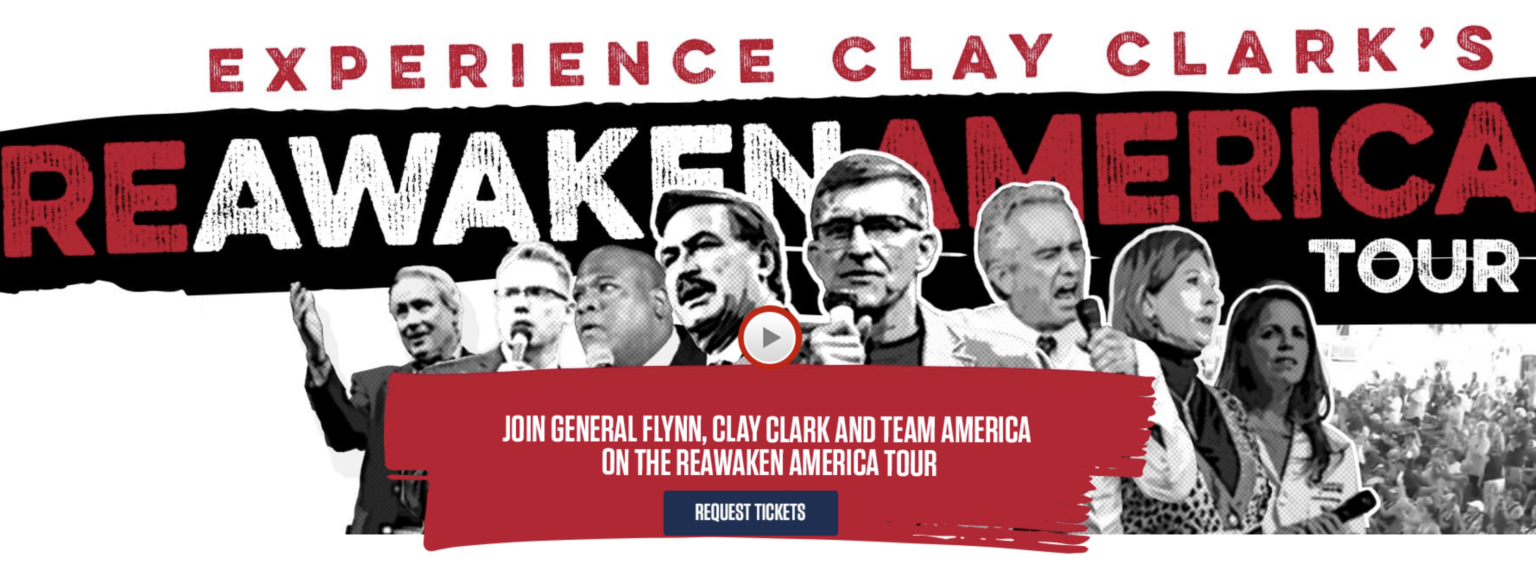
Beyond his direct participation, Lindell’s involvement often includes sponsorship roles as well, typically through the ubiquitous MyPillow advertisement model. In particular, Jericho March and Stop the Steal rally speeches are almost universally supplemented by offer codes to save on a new pillow at MyPillow.com.
Sidney Powell
If you’ve been following along closely, you have probably seen Sidney Powell already. If not, take another look at the Reawaken America Tour banner advertisement above. She doesn’t get Mike Lindell treatment, to be sure, but she’s also not part of the 40-speaker long undercard.
Like so many others on the list, Powell’s involvement did not stop at Reawaken America, but included the obligatory impartation of the spirit from the prophets and apostles on Flashpoint.
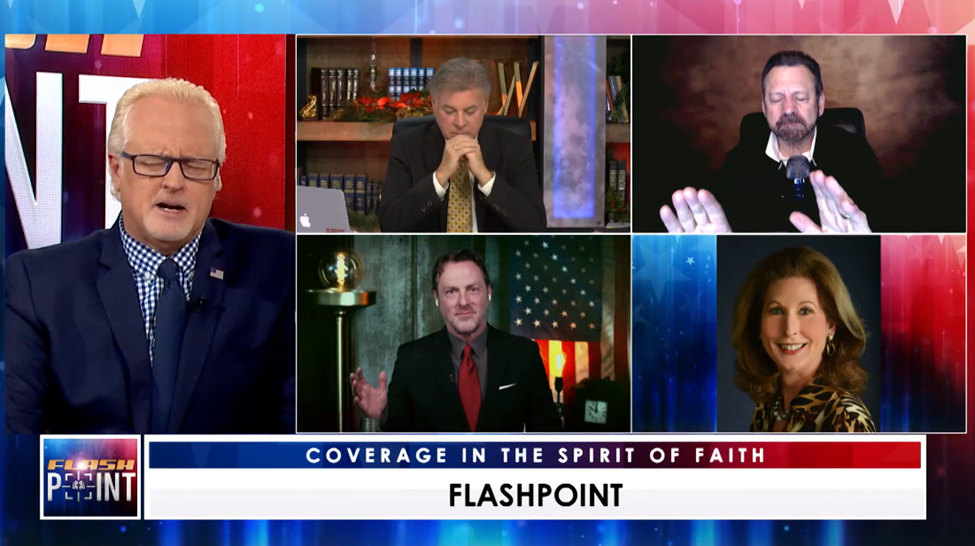
Unlike many others on this list, Powell’s personal church involvement historically is not only not charismatic, it is not necessarily even evangelical. As I explained (exceedingly poorly, as all such explanations tend to be) in Part 1, some Presbyterians would typically be considered evangelical. Her home church, reportedly the First Presbyterian Church of Asheville, North Carolina, would not. It belongs to PCUSA, typically regarded as the mainline, more theologically (and politically) liberal denomination of Presbyterian churches in the United States. As a general rule, when a church’s “About Us” page begins: “We believe God loves every person without exception. As followers of Christ, we strive to be a holy community that reflects the diversity of God’s creation through the welcome and full participation of every age, ability, socioeconomic status, family background, gender, gender identity, sexual orientation, skin color, and racial identity,” you will typically not be referred to as an evangelical community.
But Ms. Powell is an outlier in more ways than this.
Perhaps because of her job performance and perhaps because of some, shall we say, rather extravagant views about the world and some other personality traits, Donald Trump and team ostracized her from the legal process associated with his election challenges relatively quickly. That resulted in Ms. Powell’s effective removal from many of these charismatic mesh networks over time, as well. She did, however, surface at some even further fringe events, such as the For God & Country rally that took place in Dallas in May 2021. And honestly, if you can’t break out the leather biker vest at a literal Q-Anon rally, where can you, really?

The long and short of it for Ms. Powell, then, seems to be what is has been in many other cases: a fringe personality with traditional evangelical, mainline Protestant or Catholic religious views brought into the orbit of charismatic practice, language and doctrine.
Rather than give Lin Wood his own section, let us instead stipulate that most of our observations would mirror those about Ms. Powell almost identically. He was an early part of legal efforts to resist certification of the election, he did the Reawaken tour, he had his remarks about flooding churches to conduct spiritual warfare published by Charisma magazine, he was ostracized due to outlandish behavior or incompetence (hard to say) relatively quickly, and in doing attached himself to the very same Q-Anon conference circuit type events to which Ms. Powell became a presenter. Sans leather vest, I think, but I would only be speculating.
Where things differ, I suppose, is that Lin also got involved in a spat in which Clay Clark’s charismatic conspiracy theory road show was accused of spreading anthrax. And then there’s the claimed recorded conversation recounted by Wood’s former law partners in a brief filed in December 2020.
“You’re sitting with Lin Wood. Or has the second coming already started…Maybe I’m already here. You want to take the risk that you might be wrong. And I might actually be Christ coming back for a second time in the form of an imperfect man, elevating Christ consciousness…That cause you to have a little bit of a chill? …Who would be more eloquent to say what the will of God is, the belief of God in me. I represent Moses. I represent Ananias the believer. I’m like the power of King David. Now look you all, I told you I was going to pray tonight to my God, not to myself, because to me there’s God and there’s me.”
Per Law & Crime, the transcript of a recorded conversation between Lin Wood and his former law partners as submitted by the latter in a legal brief
I…I don’t know what that is. I mean, when he wasn’t threatening to send Mike Pence to the firing squads, Lin Wood certainly attached himself to the charismatic-Pentecostal mesh network, so let’s just consider that settled. But whatever this is, it isn’t evangelical, charismatic, or anything else I’m familiar with. This is…just really weird.
Eric Metaxas
He had a vision from God! When God gives you a vision, you don’t need to know anything else. You just praise Him, that He cares enough to show you what He is doing! This is what God is doing! We are what God is doing in the United States today, by His grace. And today we’re gonna see heaven move. Heaven is going to move. Thank you, Jesus. Thank you, Jesus. Before I introduce my friend Mike Lindell, who’s gonna tell you to use the discount code “ERIC”…
Eric Metaxas at the Jericho March in Washington D.C. on December 12, 2020
You may not know who Eric Metaxas is. But I assure you, in no person of note was the seemingly dual power of this narrative virus to push evangelicals toward the charismatic and fairly normal, ordinary, decent folks into rabid conspiracy theorists more evident than in Eric Metaxas.
Metaxas is perhaps best-known for his work on Dietrich Bonhoeffer, the famed German martyr and now face of the Christian resistance against Nazi encroachment into the Protestant church during World War II. His work is not without its detractors, especially among theologians and historians specializing in Bonhoeffer, but neither is it disposable feel-good evangelical pablum. Of anyone here, and anyone who will be mentioned when we veer into the designers of this particular virus, he is probably the most serious person.
Among those fellow conservatives and Christians who knew him Before Trump, they might say he was known less as a scholar than he was as a consistently funny, gentle, urbane, decent sort of fellow. At least, that’s what evangelical conservative (yes, like it or not, he is a conservative) David French said. It’s also what stood out most to Orthodox conservative writer Rod Dreher. And to VeggieTales creator and former Metaxas collaborator Phil Vischer.
Now, it isn’t the purpose of this essay to delve into the degree, if any, that Metaxas lost any of those admirable qualities. Still, the violence of the rhetoric embraced by Metaxas in defense of Trump and in arguing that the election was stolen is striking. Not just the rhetoric, mind you. After a White House meeting, the gentle-by-reputation Metaxas allegedly punched a guy riding a bicycle who had attached one too many expletives to Trump’s name for Eric’s liking. But yes, the rhetoric, too. For example, it is hard for those who knew Metaxas to square the person they knew with statements like this at the Jericho March where he acted as M.C.
“What’s going to happen is going to happen. But we need to fight to the death, to the last drop of blood because it’s worth it.”
Eric Metaxas at the December 12, 2020 Jericho March
Or like this one, from a podcast in which he managed to get then-President Trump himself on the line.
“I’d be happy to die in this fight. This is a fight for everything. God is with us. Jesus is with us in this fight for liberty. Jesus is with us in this fight for liberty…there was a prayer call last night, you cannot believe the prayers that are going up. This is God’s battle even more than our battle.”
Eric Metaxas, speaking to Donald Trump on November 30, 2020, during an interview with Pennsylvania gubernatorial candidate Doug Mastriano
The passion of his political engagement notwithstanding, the bigger surprise still has to be the rapid shift in his fellow-travelers in the Christian community. By any account, Metaxas was unequivocally a mainstream, down-the-middle evangelical Christian author. Fast forward to the late teens and early 2020s, and he is attending prophetic / apostolic rallies, emceeing Jericho Marches with celebrations of how the idea came to its founder in a prophetic dream and participating in the charismatic / Pentecostal podcast circuit.
To be fair, there have always been gradations of experience within the non-charismatic evangelical world. For example, you’d have been unlikely to hear “God gave me a prophetic vision”, but quite likely to hear something like, “I believe God is leading me” or “I believe God is calling me” or “I think God is putting something on my heart.” There’s a fine line, sometimes, between the evangelical conception of how the Holy Spirit works in subtle ways and the continuationist idea in which a Christian with the spiritual gift of prophecy receives the Word of the Lord. Maybe Metaxas was always further along that continuum than most thought, or maybe convictions, circumstances or something else caused him to move.
For our purposes, it suffices rather simply to say that whatever Eric Metaxas embraced at any point before, today he is thoroughly integrated into and suffused with the practices, language and doctrine of the spirit-filled charismatic American church.
Josh Hawley
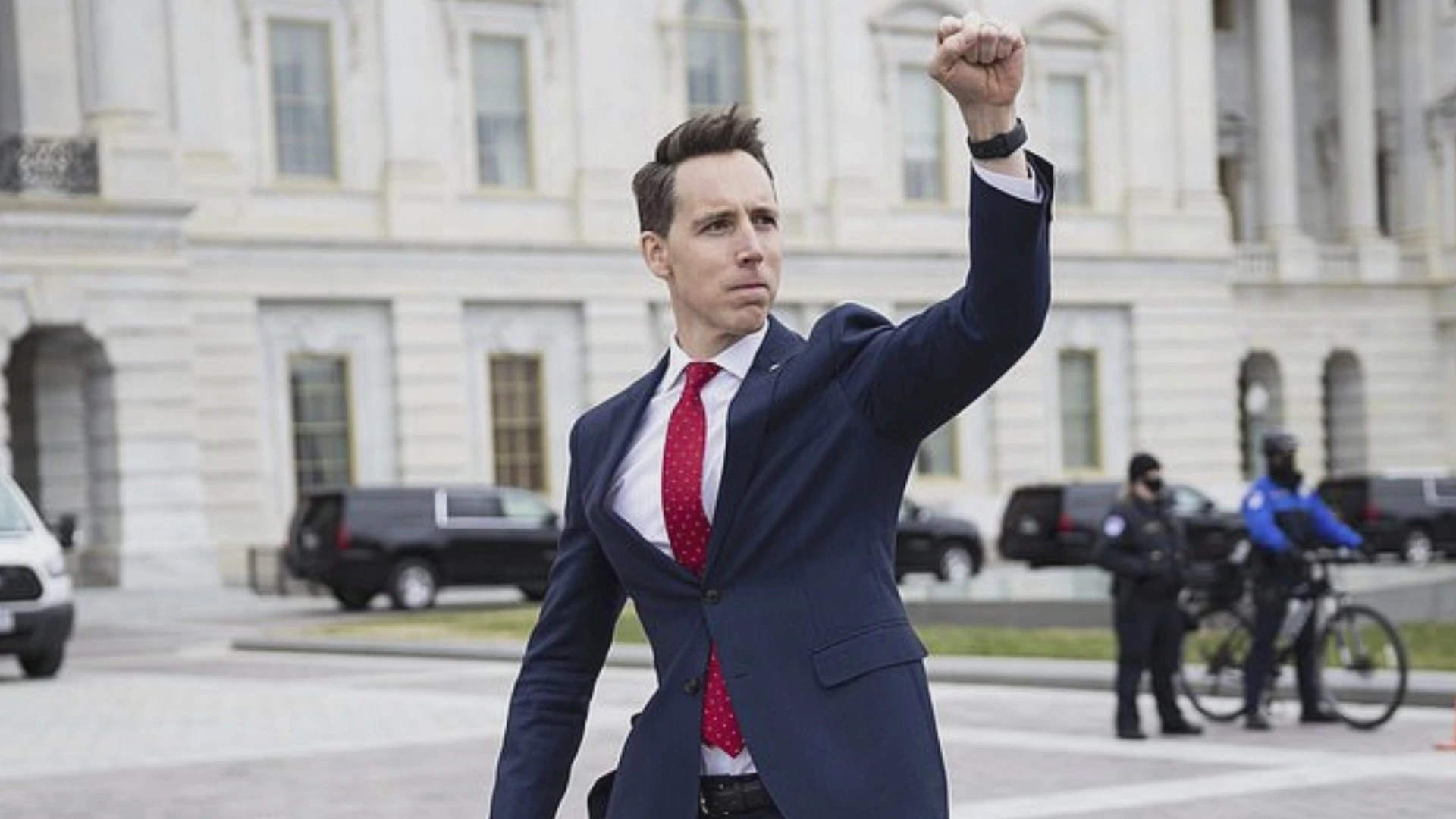
If there were anyone on this list who is – or was once, I suppose – a more serious person than Metaxas, it would have to be the senior senator from the state of Missouri, Josh Hawley.
Hawley is not Lauren Boebert. This is a summa cum laude graduate of Stanford who studied at Yale Law and clerked for John Roberts. From the very beginning of his political career, he leaned into the role of the practical Republican intellectual. Both as Missouri AG and in the senate, he crossed the aisle on a variety of issues, from COVID support payments to opposition to abuse of oligopoly and monopoly power in Big Tech. Was he winning any popularity awards with progressive voters? No. Hawley was never a moderate. But “principled” was a word used not infrequently.
Whether the transition from conservative intellectual to populist firebrand happened gradually or in a sort of epiphany during the Trump presidency falls outside of the scope of our essay series. In any case, in January 2021, Hawley embraced his role as a leading voice for the Stop the Steal movement, ultimately casting the first vote not to certify the results of the Electoral College that were brought before the US Senate. Earlier that day, he famously raised a fist in solidarity with the rioters who would force him out of the Capitol a little more than an hour later. It produced the now-iconic photograph that leads this section, a photo which also adorns practically every item in Hawley’s campaign store.
So what is Hawley up to these days?
If you guessed talking to Gene Bailey on Flashpoint immediately after the segment in which a group of charismatic-Pentecostal prophets and apostles discussed how the Hunter Biden corruption investigation was God’s response to decrees of the apostles to unmask evil, and two segments after those same prophets watch the video of Joe Biden tripping at a speaking event and pretend that it wasn’t to make you laugh at him, you win a prize! Unfortunately for you, the prize is seven more of these essays.
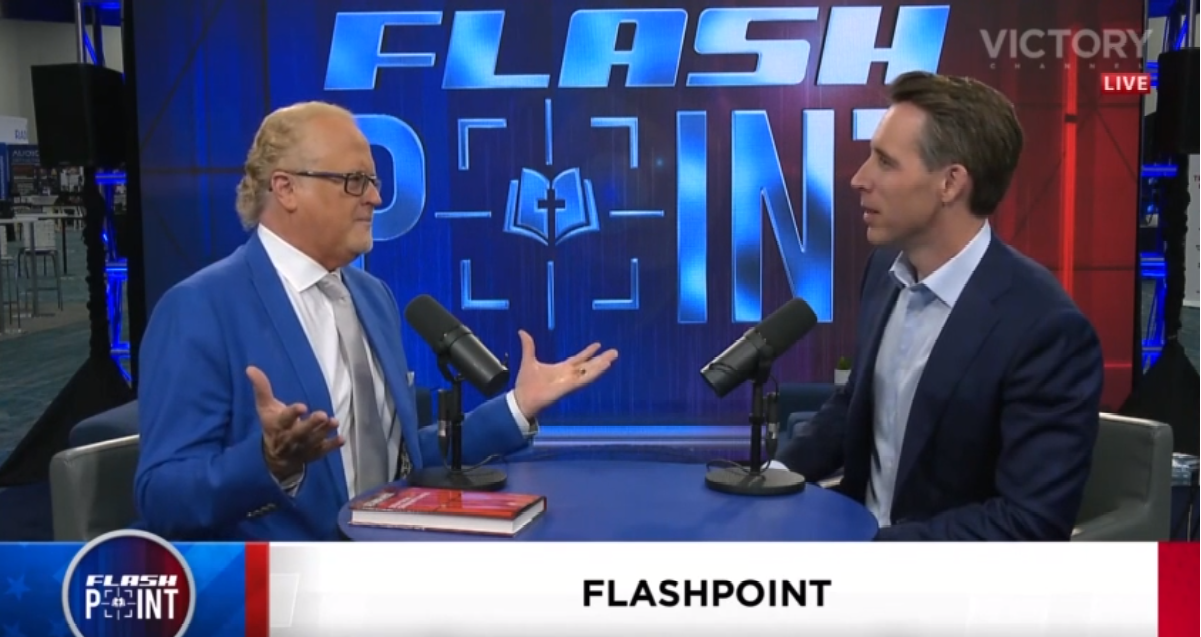
As it happens, Hawley’s faith, ignoring the years spent in Jesuit school during his youth, appears to have led him to the Evangelical Presbyterian Church. The EPC is the Presbyterian denomination committed to unity on essential doctrine, and liberty on what is non-essential. Generally speaking, for the EPC, the cessationism vs. continuationism debate, the crux of the historical distinction between charismatics and non-charismatic evangelicals, falls into the non-essential doctrine category. As a result, the EPC is where nearly all of the charismatics within the reformed Presbyterian tradition can be found. Now, there isn’t any direct evidence that Hawley’s home church is among them.
It also doesn’t matter.
Either Hawley is himself a participant in the charismatic tradition through a gifts-friendly EPC church, or he is another traditional evangelical that was brought under the umbrella of charismatic language, practices and institutions in connection with claims of a stolen election.
Everyone Else
I suppose that at some point we must talk about former President Trump himself.
There is little evidence that Trump regularly attended church prior to his election, and positive evidence that he did not do so with any regularity during his presidency. It would be impossible, I think, to describe his doctrinal perspective in any meaningful way, if it even exists at all. We have even less reason to think he would have a theologically derived opinion on the question of the continuation or cessation of the gifts of the Spirit. What we do have is a remarkable body of evidence demonstrating just how aggressively Trump courted and accepted the courtship of charismatic-Pentecostals in a way that none of his predecessors had done.
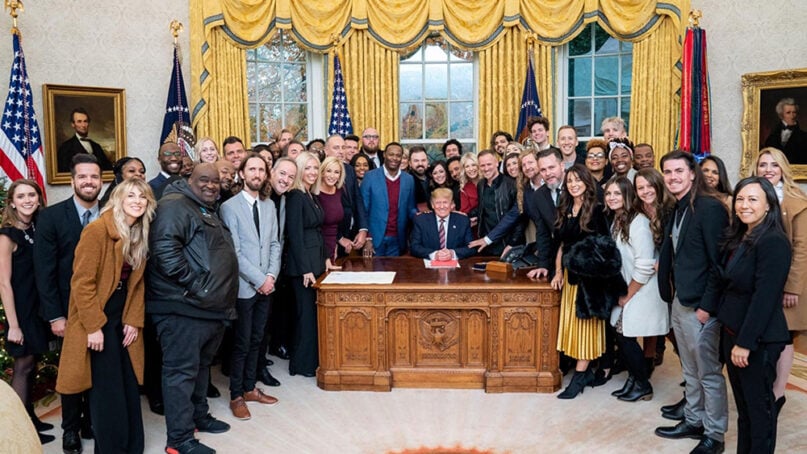
I don’t know every person in this photo. I know enough of them to feel confident saying that at least two-thirds of this room believes in modern gifts of healing and prophecy. Hillsong’s Brian Houston is slightly obscured but present. That hand stretching to touch just the hem of Trump’s garment belongs to Sean Feucht. Kari Jobe and Cody Carnes are standing right behind behind the President. Bethel’s Brian Johnson and his wife Jenn stand just over his left shoulder, with a half dozen other Bethel folks sprinkled throughout. Jesus Culture’s Chris Quilala is back there, too. Micah Stampley is present with a few of the Shift Global team around the room, including Eddie James in black leather there on the left. With the exception of Britt Nicole and maybe some people I don’t recognize, this picture is charismatics and Pentecostals from top to bottom and left to right. We will even meet a few of them in a later essay in this series.
Now, of course many other religious leaders from all sorts of faith traditions visited with Trump on various occasions. There are more than a couple photos like this with mainstream evangelical figures and ministers from black churches, too. But this photograph is a microcosm of something unprecedented that took place during the Trump presidency: not just giving the charismatic fringe a seat at the table, but pride of place. Instead of selecting a mainstream evangelical to chair his evangelical advisory panel, former President Trump selected a charismatic word-of-faith preacher, Paula White-Cain. While a minor and disconnected figure even within that faith community by the time Trump took office, the connections she made for him were often not to famous preachers at Southern Baptist megachurches, but to worship leaders and pastors at charismatic and Pentecostal churches. And yes, she, too, ended up attached to the stolen election claims, delivering the invocation at the rally that would lead to the January 6th capitol riot.
In fairness, however, not everyone involved in the stolen election grift had clear affiliations to the charismatic vernacular.
It would be impossible to tell the story of the movement to claim electoral fraud, for example, without Rudy Giuliani. Perhaps alone out of everyone of significance in the movement, he not only seemed to have zero interest in any sort of charismatic Christian displays, he has been reluctant to demonstrate religious language or affiliation of any kind.
Jenna Ellis, at times a member of Team Kraken and at times a more personal attorney to Donald Trump, has not been reluctant to express her belief in a stolen election OR her religious affiliations. She is an evangelical through and through, of the conservative and seemingly anti-charismatic bent. Separate from her election work, she has acted as a lawyer defending John MacArthur and his church from various legal claims. Now, MacArthur is a giant in the evangelical world. He is also one of the most consistent stalwarts against continuationism and the idea of modern tongues, prophecy and other similar spiritual manifestations. It seems Ellis has largely followed suit, even withdrawing from the “America’s Revival” event featuring Pastor Greg Locke on account of unsound doctrine. Jenna Ellis, I think we can conclude, did not become enmeshed with the charismatic-Pentecostal movement as a result of her legal work asserting a stolen election.
Ali Alexander, nominally a Catholic, flirted at various times with light language of intercession and spiritual warfare, but otherwise seemed to have, um, other flirting priorities in mind.
Otherwise, it is virtually a clean sweep. If you were a public figure involved in the campaign to promote a stolen election narrative, you were either charismatic or Pentecostal by faith, or else you (willingly or kicking and screaming) subjected yourself as a Catholic, evangelical, mainline Christian or agnostic to apostles and prophets speaking over you, laying hands on you, anointing you, and praying away demonic portals next to you as a sort of precondition of influence within and access to the community that had formed.
This adherence is by no means a feature only of our narrative virus’s banner carriers, however. To wit, Denison University researcher Paul Djupe conducted a 2022 survey of Republicans, looking for the intersection of belief in modern prophecy and the belief that the 2020 election was stolen. It is an especially shrewdly formulated question, I think. The belief in the validity of modern prophecy is – or at least it ought to be – the clearest and cleanest line of demarcation between charismatic-Pentecostals with a continuationist belief in the gifts of the spirit on the one hand, and the rest of Protestant Christianity on the other.
And guess what?
Republican believers in modern prophecy were twice – twice! – as likely to believe that the election was stolen than those who disbelieve in modern prophecy.
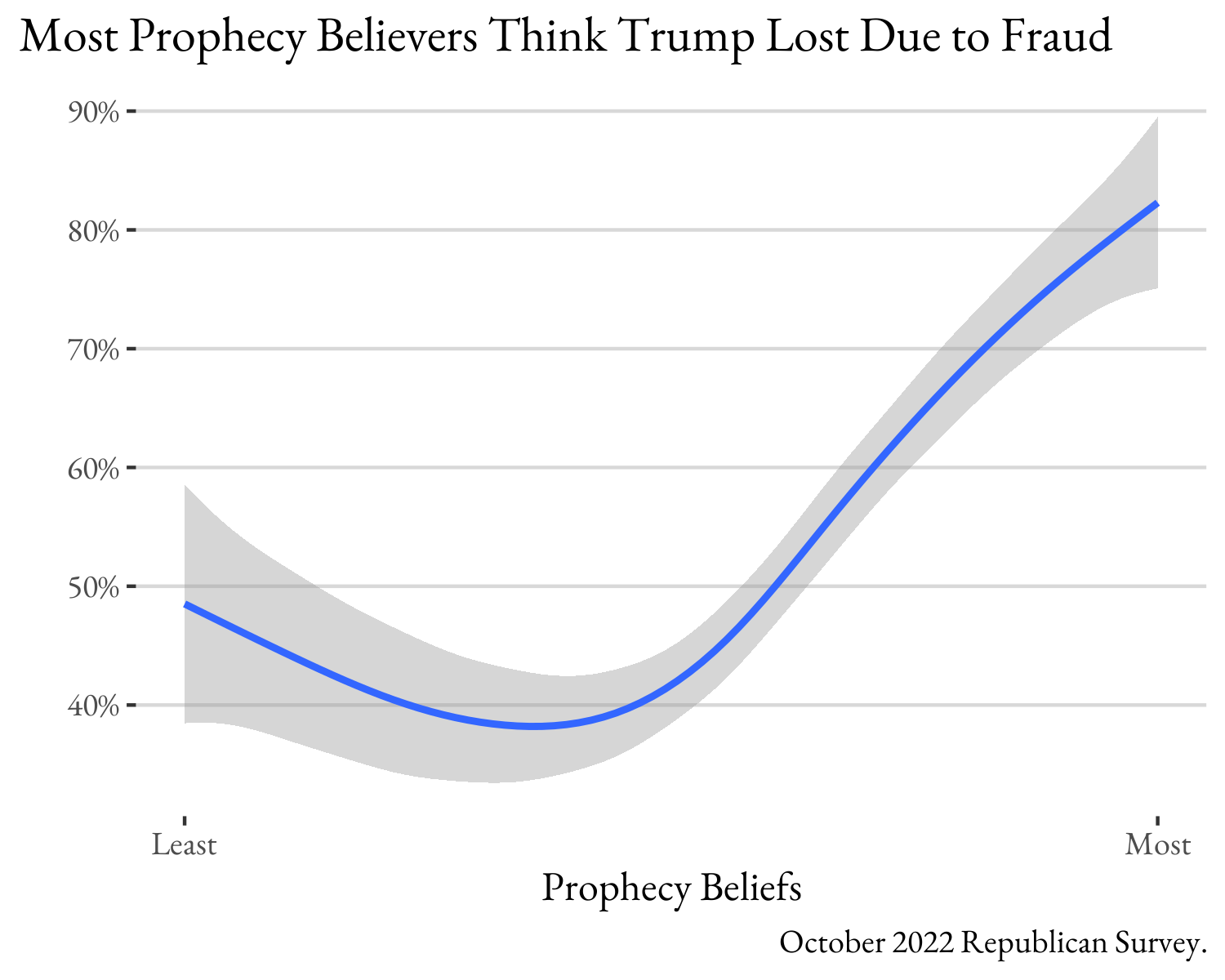
Without casting a single aspersion on whether any of this was good or bad, wrong or right, we are still left to wonder, “How? And why?”
How did adherence to the practices, language and, at times, doctrine of a religious movement broadly thought to be a bit weird and outside the mainstream come to be the most idiosyncratic and defining characteristic of those who embraced a fringe theory about election outcomes? Why did its association with that electoral movement seem to grant it increasing power in the religious world, empowering its practice, language and doctrine to make rapid inroads into more staid evangelical and mainline Protestant individuals and communities (read: how does Eric Metaxas happen)?
In our next installment, we will publish Part 3 of this series, which visits the underlying memetics that gave the narrative virus its power.












Nine parts. I can only imagine how many hours of discussion went into this. Looking forward to all of it.
@rguinn I was wondering: did you use the narrative machine retrospectively, whether wholly or in part, to identify the sources here?
As someone raised Catholic and currently attending an evangelical Baptist church I audibly guffawed at this paragraph. Absolute perfection.
As a socially liberal and fiscally conservative Presbyterian who is probably more agnostic now and (yes a run-on sentence) am fully ingrained with the fact that our country’s laws are based on Presbyterian polity, I too laughed out loud at this statement.
Levity, a good carrier for important considerations.
Rusty,
Curious to see what attention, if any, the doctrine of biblical innerancy will get in this series.
As a teenager, I was baptized in and eventually pastored at a wonderful Foursquare church in Oregon. Additionally, for several years during that time, I lived with 4 Calivinist buddies of mine.
During my years-long exposure to both charismatic Pentecostalism and Calvinism, I found over and over again how fundamentally problematic the doctrine of biblical inerrancy and literalism is for all churches, regardless of whether it’s the reformed Eric Metaxas/Wayne Grudem/John Piper type or the charismatic Pentecostal Benny Hinn type.
In my experience, the “charismatic norms” (like prophesy), can be a really beautiful thing. But it’s when the charismatic norms (like prophesy) are connected to the doctrine of biblical inerrancy/literalism that things can go super sideways and do anything but “edify”. As I see it, inerrancy is the core virus that has been wreaking havoc in the churches (you name the tradition) and the world for centuries.
Anyway, really looking forward to reading these notes.
Three of the mentioned fellows will make at least a cameo appearance, but it isn’t necessarily a focus of the series. I agree that it would also be fascinating to see how that narrative - the soul of American evangelicalism, really - emerged and became common knowledge, but that would be a different series.
In part, although as I think you’ll discover as we go along, our aim was to be thorough enough not to have to be stingy in our source selection.
Man, fascinating stuff. Can’t wait to read the rest.
I was raised mainline Protestant in NY in the 80s. Never even heard of Charismatics until I moved to TX as an adult.
I think I understand why it is the fastest-growing branch of Christianity. Vs the stuff I was raised with, my first impression as an outsider is the level of passion and… hmm… immediacy.
I’m assuming that this is the basic story we’re discussing, I had not heard it yet. It explains what some prophets need(ed?) to be true and why.
This was a great and insightful read, @rguinn.
“Like the Widening Gyre, the most effective vectors for effective astroturfing campaigns may focus not so much on changing common knowledge but on changing What We Need to Be True.”
Inoculation against direct responsibilities is one of the fundamental traits of human beings’ proto-centralized religions. In a context of apparent lack of control, agency was projected outward.
Witchcraft was the reason for pain without feeling guilty and gods’ (God) wrath for pain when feeling guilty in ancient cultures.
In this context of apparent lack of control (post 2008), changing what we need to be true is an escape from direct responsibilities when focusing on the excuses that explain the individual or collective failure as an out-of-control external factor (spiritual: evil-witchcraft- the devil or kind of real threats: immigrants - woke - deep state), that apparently has agency and goes directly against you as a cosmic good vs. evil fight. So, it’s the perfect context for this phenomenon to emerge in the American-style, spirit-filled charismatic Christianity.
Low locus of control (direct control over outcomes) + belief in miracles (indirect control over outcomes) + best in class already system of memes (Christianity).
You’ve got it nailed. Only I think that we will discover that there are many more areas of our society and culture which exhibit very similar traits in very different wrappers.
Really interesting start…as someone who has walked among the movements you reference, I’m looking forward to your reflections and observations.
I’ll just observe here that the role of discernment has always been the weak link when it comes to Pentacostal/Charismatic movements.